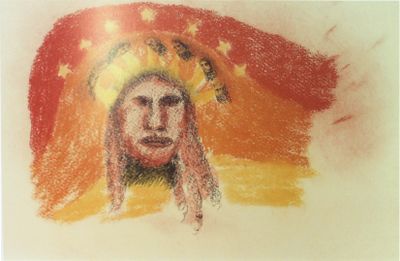Ancient Indian culture

The Urindian culture or ancient Indian culture (7227 - 5067 BC), the Age of Cancer, was the first post-Atlantean cultural epoch and served primarily to shape the etheric body. At that time, the vernal equinox was in the constellation of Cancer. The 7 holy Rishis sent by Manu were the great spiritual guides at that time. In the Apocalypse of John, in the Epistle to the Church of Ephesus, reference is made to the primeval Indian time.
In the primeval Indian culture, a memory of the polar time shines forth, in which the Sun, Earth and Moon were still united with each other in a huge world structure. They felt and worshipped this primordial entity as Brahma.
„The first, the primeval Indian period, developed a religion which appears like an inner illumination, like an inner repetition in ideas and feelings of the very first period when the Sun and Moon were still united with the Earth, when those sublime beings of the Sun still dwelt on the Earth. We can imagine that a sublime idea had to be awakened there. And the spirit which united with all the Angels and Archangels, with all the Spirits, high Gods and Beings, in the first state of the Earth, the primeval mist, was united by the Indian consciousness under a high individuality, under the name of Brahm, Brahma. In spirit, the first cultural epoch of the post-Atlantean period repeated what had happened. It is nothing other than a repetition of the first Earth epoch in inner beholding.“ (Lit.:GA 106, p. 34f)
In India at that time lived people who were descended from the best parts of the Atlantean population. They still had a very vivid memory of the old Atlantean state of mind and a natural clairvoyance was still widespread or could still be awakened very easily. The ancient Indians still had a very strong longing for the spiritual world, whereas they perceived the sensual outer world as maya, as a veil that darkened their own spiritual reality. In powerful images, the seven holy Rishis were able to give them a distant idea of the Christ descending to Earth from cosmic heights, whom they knew under the name Vishva Karman. The Vedas, which came into being much later, namely in the Egyptian-Chaldean cultural epoch, only give a faint echo of the flourishing of the primeval Indian culture. For a long time, they were only passed down orally and were not written down until the 5th century AD, i.e. already in the Greco-Latin period.
Literatur
- Rudolf Steiner: Ägyptische Mythen und Mysterien, GA 106 (1992), ISBN 3-7274-1060-4 English: rsarchive.org German: pdf pdf(2) html mobi epub archive.org
 |
References to the work of Rudolf Steiner follow Rudolf Steiner's Collected Works (CW or GA), Rudolf Steiner Verlag, Dornach/Switzerland, unless otherwise stated.
Email: verlag@steinerverlag.com URL: www.steinerverlag.com. Index to the Complete Works of Rudolf Steiner - Aelzina Books A complete list by Volume Number and a full list of known English translations you may also find at Rudolf Steiner's Collected Works Rudolf Steiner Archive - The largest online collection of Rudolf Steiner's books, lectures and articles in English. Rudolf Steiner Audio - Recorded and Read by Dale Brunsvold steinerbooks.org - Anthroposophic Press Inc. (USA) Rudolf Steiner Handbook - Christian Karl's proven standard work for orientation in Rudolf Steiner's Collected Works for free download as PDF. |
